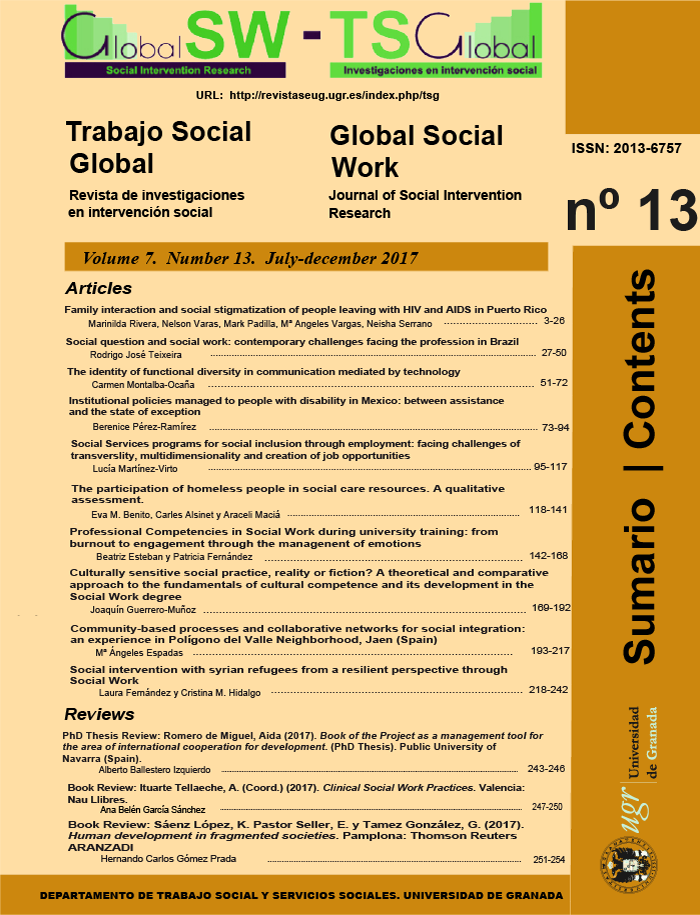Community-based processes and collaborative networks for social integration: an experience in Polígono del Valle Neighborhood, Jaen (Spain)
DOI:
https://doi.org/10.30827/tsg-gsw.v7i13.6481Keywords:
Community-based participation, social inclusion, food guarantee programs, social work networkingAbstract
The purpose of this paper is to reflect on one of the main axes that must be developed by inclusion strategies: the improvement of disadvantaged people's community participation and integration. In the first part, general aspects of social participation in inclusion projects are revised. Indicative data about the reduced effective contribution of different social actors to this axis are also provided. In the second part, the project “Community of Neighbourhood” is presented as an experience of inclusióon. In this project, the local community has been integrated into a network, involving local NGOs, public administrations, citizen movements, formal and informal social fabric, low-income populations, and people in difficulty as a result of the economic crisis. The history of citizen involvement and the politicization of the neighborhood where it is carried out, together with social innovation through participatory actions and collaborative work between professionals and citizens, are the cornerstone of this successful experience which builds a real pathway towards community inclusion for low-income people, showing a different way to work, far from neo-charity practices or services privatizations.
Downloads
References
Aguilar, M., Llobet, M. y Pérez, B. (2012). Los servicios sociales frente a la exclusión. Zerbitzuan, 51, 9-26.
Alonso, L.E. y Jerez, A. (1997). Hacia una politización del Tercer Sector en Jerez, A. (Comp.) Trabajo Voluntario o Participación. Elementos para una Sociología del Tercer Sector. Madrid: Ariel.
Asociación Andaluza de Barrios Ignorados (2012). Que sea delito dejar a una familia sin recursos. Recuperado de https://drive.google.com/file/d/0BxEMH6Jvf0bbVHFQcUl3YTFoR2s/view
Benedicto, J. y Morán, M.L. (2002). La construcción de la ciudadanía activa entre los jóvenes. Madrid: INJUVE. Recuperado de http://www.injuve.es/sites/default/files/LA%20CONSTRUCCION.pdf).
Cádiz, L. (2015, 28 agosto). El Polígono del Valle ´se rebela´ contra más de un 70% de paro. IDEAL-Jaén. Recuperado de http://www.ideal.es/jaen/jaen/201508/26/poligono-valle-rebela-contra-20150825234626.html
Comunidad de Barrio del Polígono del Valle (2016). Memoria 2015/16. Proyecto Circuito de cocina familiar comunitaria. Jaén (Documento no publicado).
Consejo General de Trabajo Social (2016). II Informe sobre los Servicios Sociales en España. Madrid: CGTS.
EAPN (2010). Propuestas del Tercer Sector de acción social para una estrategia de inclusión social 2020 en España. Recuperado de http://www.eapn.es/ARCHIVO/documentos/recursos/2/Propuestas2020.PDF
Espadas, M.A. (2007) El Tercer Sector construyendo ciudadanía. La participación del Tercer Sector en los Servicios Sociales en Andalucía. Madrid: Universidad Complutense. Recuperado de http://biblioteca.ucm.es/tesis/cps/ucm-t29504.pdf.
Francés García F.J. (2016). Metodologías participativas para la investigación y la intervención social. Alicante: Servicio de publicaciones de la Universidad de Alicante.
Fundación Esplai, (2003). El Tercer Sector visto desde dentro. Barcelona: Fundación Esplai.
Fundación Proyecto Don Bosco (2014). Circuito de cocina familiar comunitaria, Jaén. Memoria 2014. Jaén (documento no publicado).
Herrera, M.R., Díaz, R.M. y Rodríguez, M.J. (2016). Innovación social comunitaria: miradas a una experiencia de ocupación en vivienda. Cuadernos de Trabajo Social. 29(2), 225-238.
Martinez Virto, L. (2017). La crisis se lleva la capacidad de resistir de muchas familias. En España en Análisis y Perspectivas 2017: Desprotección Social y estrategias Familiares. Madrid: FOESSA. 23-28.
Morán, M.L. y Benedicto, J. (2015). Culturas políticas y ciudadanía en el marco de una crisis institucional en Torres Albero, C. (Ed.) España, 2015. Situación Social. Madrid: CIS.1115-1125.
Pérez Eransus, B. (2016). Una propuesta de análisis de las políticas de inclusión. Revista Española del Tercer Sector, 33, 47-63.
Plataforma de ONG de Acción Social, (2013). Diagnóstico del Tercer Sector de Acción Social. II Plan Estratégico del Tercer Sector de Acción Social. Madrid: POAS.
_______ (2015). Resumen ejecutivo. Madrid: POAS
Red CIMAS (2015). Metodologías participativas. Sociopraxis para la creatividad social. Madrid: Dextra.
Rodriguez Cabrero, G. (2003). La estructura motivacional en las organizaciones voluntarias de acción social. En Rodriguez Cabrero (Coord.) Las entidades voluntarias de acción social en España. Informe general. Madrid: Fundación FOESSA.
Rodriguez Cabrero, G. (Coord.) (2015). Análisis prospectivo sobre los retos actuales y futuros del Tercer Sector de Acción Social en España. Parte II: Los retos del tercer Sector de Acción Social. Madrid: POAS. Recuperado de http://www.plataformaong.org/ciudadaniaactiva/tercersector/analisis_prospectivo_retos_del_TSAS_parte_2.pdf
Secretaría de Estado de Vivienda (2011). Informe sobre Barrios Vulnerables. Recuperado de http://habitat.aq.upm.es/bbvv/
Torres Albero, C. (2015) (Ed.) España, 2015. Situación Social. Madrid, CIS
Zubero, I. (2015). Las relaciones entre el TSAS, los movimientos sociales y las nuevas formas de participación en la sociedad. En Rodríguez Cabrero, G. (Dir.), Análisis prospectivo sobre los retos actuales y futuros del Tercer Sector de Acción Social en España (pp. 64-100). Madrid: Plataforma Ong de Acción Social. doi: 10.13140/RG.2.1.3322.8883
Downloads
Published
How to Cite
Issue
Section
License
Authors publishing in this journal agree to the following terms:
- Authors retain their copyright. They guarantee to this journal the right to a first publication of the work submitted to initiate the editorial process.
- Authors know that their work is published under a Creative Commons License which allows others to share it, with a recognition of the work's authorship and its initial publication in this journal.
- Authors share with Global Social Work explotation rights of the work that has been published in this journal, authorizing the execution of a free reproduction, distribution and public communication. Authors know that their work will be stored on servers and reproduced in digital format for inclusion in institutional repositories and databases that will facilitates free access to the full text of the work.
- Authors may distribute the version of the work published in this journal (for example, to an institutional repository or publish it in a book), with the explicit acknowledgment of its initial publication in this journal.
Copyright on the texts published in Trabajo Social Global -Global Social Work, as well as editorial policy of the journal refering to self-file and deposit in institutional or thematic repositories, are identified in the database





















